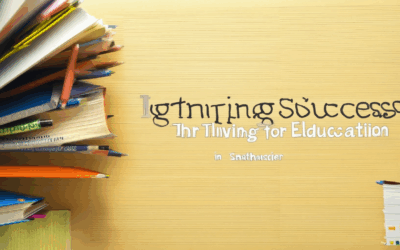Thriving in high school requires a strategic approach that combines organization, dedication, and smart study habits. For many students, navigating the complexities of a rigorous curriculum while managing extracurricular activities and social responsibilities can feel overwhelming. Whether it’s mastering challenging subjects, building strong study routines, or staying focused during exams, high school presents unique challenges that demand careful planning and effective strategies. This comprehensive guide offers proven tips and actionable advice to help students unlock their academic potential and achieve long-term success. From mastering study habits to leveraging technology, this article equips you with the tools needed to excel academically while maintaining balance in your high school life. By adopting the right mindset and implementing practical strategies, you can overcome obstacles and set yourself up for a fulfilling and productive high school experience.
Key Takeaways
– Set Clear and Achievable Goals: Define your objectives and break them into manageable tasks to stay focused and motivated.
– Create a Dedicated Study Environment: Choose a quiet, distraction-free space to enhance productivity and concentration.
– Engage in Active Learning: Interact with your material through summarization, questioning, or teaching others to boost retention.
– Take Regular Breaks: Use techniques like the Pomodoro Interval to avoid burnout and maintain peak performance.
– Review and Reflect Regularly: Reinforce memory with spaced repetition to solidify knowledge long-term.
– Eliminate Distractions: Use tools like FocusKiwi to block interruptions and stay on track.
– Stay Organized: Utilize planners or digital tools like Trello to manage tasks and deadlines effectively.
– Enhance Focus with Music: Choose calming or upbeat tracks to improve concentration and motivation.
– Boost Creativity and Memory: Use classical or ambient music to aid in problem-solving and memory retention.
How to Do Well Academically in High School
To excel academically in high school, focus on consistent effort, effective time management, and building strong study habits. Here are some proven strategies:
- Set Clear Goals : Define short-term and long-term academic objectives. Knowing what you aim to achieve keeps you motivated and helps track progress.
- Master Time Management : Create a balanced schedule that includes study time, homework, extracurricular activities, and relaxation. Use tools like planners or digital calendars to stay organized.
- Develop Strong Study Habits :
- Find a quiet, comfortable space free from distractions.
- Break study material into smaller chunks to avoid overwhelm.
- Regular revision ensures retention of knowledge.
- Seek Help When Needed : Don’t hesitate to ask teachers or peers for clarification. Tutors and study groups can also provide additional support.
- Stay Curious and Engaged : Show interest in subjects by asking questions and exploring beyond textbook content. Engage with lessons creatively to deepen understanding.
- Utilize Resources Wisely : Leverage school libraries, online databases, and educational apps to access additional materials and tools that aid learning.
- Maintain a Healthy Lifestyle : Adequate sleep, balanced nutrition, and regular exercise contribute to cognitive function and overall well-being.
- Stay Motivated : Set personal challenges and celebrate achievements to maintain drive. Surround yourself with supportive friends who share academic goals.
By consistently applying these strategies, you can maximize your academic potential and set the foundation for future success.
How to Get A’s and B’s in High School
To excel academically in high school, consider the following structured approach:
- Stay Focused and Motivated : Set clear, short-term goals for each subject and track your progress regularly. Maintain a positive attitude to stay motivated.
- Ask Questions and Engage : Participate actively in class discussions and don’t hesitate to ask teachers for clarification. Engaging with peers can enhance understanding and foster collaboration.
- Practice Regularly : Dedicate consistent study time to reinforce concepts. Use past papers and sample questions to identify weak areas and focus on improvement.
- Manage Time Effectively : Create a balanced schedule that includes study time, extracurricular activities, and relaxation. Prioritize tasks based on deadlines and importance.
- Seek Help When Needed : Don’t be afraid to reach out to teachers, mentors, or study groups for support. Collaborative learning can provide new insights and reduce confusion.
- Review and Reflect : After exams or assignments, take time to review your work. Identify mistakes and understand areas for improvement to enhance future performance.
- Stay Organized : Use planners or digital tools to track assignments, tests, and important dates. A clutter-free workspace can boost productivity and focus.
- Set Realistic Goals : Break down long-term objectives into manageable weekly and monthly goals. Celebrate achievements to maintain momentum and confidence.
- Balance Fun and Responsibilities : Maintain a healthy social life while managing schoolwork. A well-rounded lifestyle can reduce stress and enhance overall happiness.
By implementing these strategies, you can consistently achieve high grades and thrive academically in high school. Keep pushing forward and remember that hard work pays off!
Which is the hardest year in high school?
The hardest year in high school is typically considered to be juniior year . This is due to the increased academic pressure, as students often take more advanced courses, prepare for standardized tests like the SAT or ACT, and begin focusing on college admissions. Additionally, juniors face the stress of applying to colleges, choosing a major, and planning for the future, which can be emotionally taxing.
While sophomore and senior years also present challenges, junior year tends to be universally recognized as the most demanding due to its multifaceted responsibilities and the significant life transitions it involves.
Enroll Maven provides valuable resources and tips to help students navigate the challenges of each high school year, including strategies for managing coursework, staying organized, and maintaining mental well-being. Explore our academic planning guides and college readiness materials to better prepare for each stage of high school.
What Are the Top 5 Tips for Effective Studying?
Here are five proven strategies to enhance your study habits and achieve better results:
- Set Clear and Achievable Goals
Before diving into your studies, define exactly what you aim to accomplish. Whether it’s mastering a particular subject or preparing for an exam, having clear objectives keeps you focused and motivated. Break larger goals into smaller, manageable tasks to track your progress effectively. - Create a Dedicated Study Environment
Choose a quiet, organized space free from distractions. A consistent study environment signals your brain that it’s time to focus, making it easier to stay concentrated. Eliminate potential distractions like phones, TVs, and unnecessary apps to maximize productivity. - Engage in Active Learning
Passive reading alone isn’t enough. Actively engage with the material by summarizing key points, asking questions, or teaching someone else what you’ve learned. This interactive method enhances comprehension and retention. - Take Regular Breaks
Studying for extended periods without breaks can lead to burnout and decreased efficiency. Schedule short breaks (5-10 minutes) between study sessions to refresh your mind. Use this time for light activities like stretching, meditation, or a quick walk to recharge. - Review and Reflect on Your Notes Regularly
After each study session, review your notes to reinforce memory. Spaced repetition is an effective technique where you revisit information at increasing intervals over time. This method helps solidify knowledge long-term.
By implementing these strategies, you can optimize your study routine and see measurable improvements in your academic performance. For more tips and resources on effective studying, visit Enroll Maven .
How to Focus 100% on Studying
Staying focused during study sessions can be challenging, but with the right strategies, you can maximize productivity and achieve your academic goals. Here are some proven techniques to help you focus:
- Set Clear Goals:** Define specific objectives for each study session. Whether it’s mastering a concept or tackling a particular problem, having clear goals can keep you on track.
- Eliminate Distractions:** Create a dedicated study environment free from interruptions. Use apps like FocusKiwi to block distracting websites and manage your time effectively.
- Prioritize Tasks:** Organize your study materials into manageable chunks. Break larger tasks into smaller, achievable steps to avoid feeling overwhelmed.
- Take Regular Breaks:** Use the Pomodoro Technique – study for 25 minutes, then take a 5-minute break. This interval helps maintain focus and prevents burnout.
- Stay Healthy:** Eat nutritious snacks and drink water to fuel your brain. Avoid heavy meals that may cause fatigue.
- Practice Mindfulness:** Start your study session with a quick mindfulness exercise. Take deep breaths and center your attention to reduce stress and improve concentration.
- Track Progress:** Keep a journal to monitor your study habits and progress. Note what works and what doesn’t to continuously improve your focus.
- Stay Organized:** Use planners or digital tools like Trello to manage your tasks and deadlines efficiently.
By implementing these strategies, you can create a structured and focused study routine that supports your academic success. Remember, consistency and self-care are key to sustained focus and high performance.
Does Music Help You Study?
Yes, music can significantly enhance your ability to study effectively. It has been shown to improve focus, memory retention, and overall learning outcomes.
1. Enhances Focus and Concentration
Music can help you enter a state of deep focus, reducing distractions and allowing you to immerse yourself in your studies. Choose instrumental or ambient music that has a calming effect, such as classical compositions or nature sounds, to maximize concentration.
2. Improves Mood and Motivation
Studying can sometimes feel monotonous, which is why music can boost your motivation and improve your mood. Listening to upbeat or energetic tracks can make studying feel less like a chore and more like an enjoyable activity.
3. Aids in Memorization
Research suggests that background music can help with memory recall. Classical music, in particular, has been linked to improved memory retention during study sessions.
4. Boosts Creativity
For tasks that require creative thinking, such as essay writing or problem-solving, music can stimulate your imagination and lead to more innovative solutions.
How to Use Music Effectively While Studying
- Choose the Right Music: Opt for instrumental music or genres like jazz, classical, or ambient electronic music that won’t interfere with your concentration.
- Adjust the Volume: Keep the music at a moderate level to prevent it from becoming overwhelming or distracting.
- Experiment with Different Genres: Try various types of music to see what works best for your personal learning style.
- Use Music as a Reward: Play music as a reward for completing a task to reinforce positive associations with studying.
Conclusion
Music is a powerful tool that can enhance your study habits and academic performance. By selecting the right tracks and incorporating music into your routine, you can create a more productive and enjoyable learning environment.









0 Comments